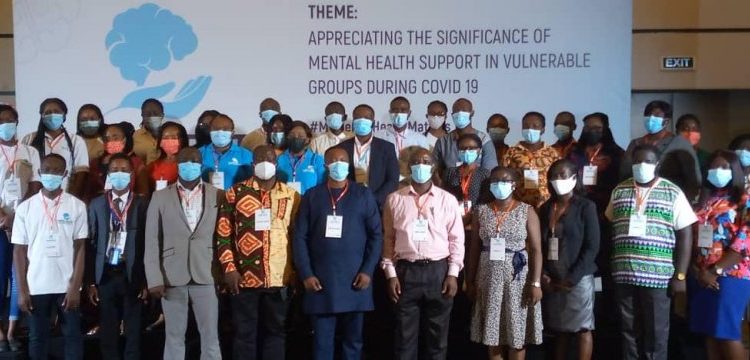Professor Akwasi Osei, Chief Executive, Mental Health Authority, has called on policy makers and stakeholders to pay particular attention to mental health and psychosocial support needs of vulnerable groups.
These vulnerable groups include women and children exposed to abuse or violence, the elderly, health care and other frontline workers, refugees, migrants and individuals living with cognitive, intellectual and psychosocial disabilities.
Prof. Osei, in a speech read on his behalf, made these remarks at a mental health conference organised by the Ghanaian-German Centre for Jobs, Migration and Reintegration (GGC).
The event was on the theme, “Appreciating the Significance of Mental Health Support in Vulnerable Groups during the COVID19 pandemic.”
He said the pandemic with its restrictions had brought to the fore the important role of mental health among the public, especially vulnerable groups.
“The mental health consequences of the pandemic ranges from stress associated with the risk of infection, quarantine, and the traumatic experiences of sudden loss of lives and livelihoods within families and communities,” he added.
The Chief Executive said the advent of the pandemic had increased cases of mental health across the globe, saying, vulnerable groups were the most affected.
He said, therefore, there was the need for stakeholders in health care to create awareness on the availability of mental health and psychosocial support services for such persons.
“Furthermore, such individuals could be discriminated against and can face issues of stigmatisation should they become infected with a respiratory symptom which may not be COVID19 related,” he added.
Prof. Osei indicated that another cause of the upsurge of the medical condition during the pandemic was the excessive intake of alcohol and other substances during quarantine.
“One of the common method of coping with stress, which can have a further negative effect on both physical and mental, is excessive use of alcohol and other drugs.”
“It is also a fact that alcohol and substance use can increase during periods of disaster and pandemic such as this; however, such increases do not necessarily return to normal levels post-disaster, overtime,” he said.
He said the Authority had adopted a 10-year strategy that sought to ensure equity such that services to be provided to all, prioritising the needs of the most vulnerable population and promoting gender sensitivity, as well as geographical accessibility.
He said the strategy was an effort to improve access to health care services for vulnerable population such as people living with cognitive, intellectual and psychosocial disabilities.
Mr David Tette, Senior National Programme Coordinator, GGC, said the objective of the conference was to identify the need for mental health support for vulnerable groups.
“The main objective of the event is to create awareness on the availability of mental health and psychological support services provided by GGC,” he added.
Mr Tette said they were complimenting the efforts of stakeholders in that regard to mitigate the global rise of psychosocial challenges in the wake of the pandemic.










Discussion about this post